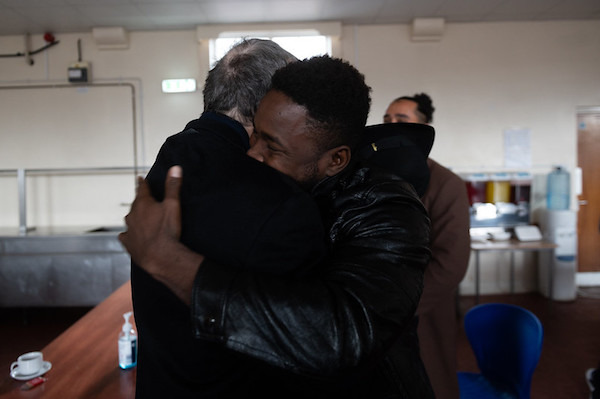Pope Francis, referencing the gospel of Matthew (25:35-43), reminds us that every stranger who knocks on our door is an opportunity for an encounter with Jesus.
Whenever I read this, I think of the kindness shown by many strangers whom I have encountered and who later became friends. I remember Joseph, who lived with us when I was growing up, having fled in search of safety and a better life. Every morning, I would quiz him on his whereabouts the night before, fascinated by his stories. I learnt and laughed a great deal over those breakfasts before school.
I am also reminded of Fatema, my old neighbour who knocked on our door at Eid al-Fitr with what can only be described as a feast. It was delicious. Throughout the pandemic, whilst looking after her three children in a small flat with no outdoor space and the chaos that entails, she always kept an eye out for me and my housemates and offered a heart-warming smile every time we walked past their kitchen window.
This week the international affairs department of the Catholic Bishops’ Conference of England and Wales released Love the Stranger, a timely and important document drawing together over 100 years of Church teaching in relation to migrants and refugees. It reminds us, amid the noise, to go back to the heart of it all, the human person.
Loving the stranger has always been part of how we live out our Christian faith and the bishops’ 24 principles offer a practical framework through which we can do just that. These principles are found within six different threads of Catholic social teaching: the universal family; the right to flourish in one’s homeland; the right to migrate; human dignity; the evils of slavery; and the gift of migration.
Reading the document, it would appear that recent political developments and rhetoric are at odds with the teachings of the Church.
Our bishops clearly set out the need for an “extension of safe routes such as resettlement programmes, visa schemes and humanitarian corridors” so that people don’t have to make dangerous journeys that so often end in tragedy. They urge us to “defend the fundamental human dignity of all migrants and refugees regardless of their legal status”. And they call upon the government “to avoid the use of immigration detention, arbitrary expulsion and other practices that violate human dignity”.
Love the Stranger can be used as a tool for each of us to live out our faith and to challenge policies that fail to uphold human dignity.
But the document transcends politics. It encourages each one of us to create a culture of welcome. Ahead of 2021’s World Day of Migrants and Refugees which focused on building an “ever wider we”, I had the privilege meeting of Paul who was part of a group in Leeds diocese that welcomed a refugee family. He spoke eloquently about community sponsorship and the gift of migration.
When he reflected on his own experience of encounter, Paul spoke of discovering other ways of “being family, of making big decisions, of worshipping God and that [was] so enriching”.
It is this very gift of encounter about which Pope Francis often speaks. And this is why the present discourse is so heart-breaking.
It is difficult to discern anywhere within current political debate the principles articulated in Love the Stranger. When politicians and commentators refer to desperate people in search of a better life here as an “invasion”, it matters. When the news reduces the names and stories of those who die in the Channel to mere statistics, it matters.
All of this makes it harder for each of us to look beyond the label and see the person.
In their foreword to Love the Stranger, Bishop Paul McAleenan, the lead bishop for migrants and refugees, and Bishop Declan Lang, chair of the international affairs department, urge us to “see the person who has left their homeland in search of a better life”.
Later, affirming the message of the Vatican migrants and refugees section, they highlight how “people on the move bring along with them a great potential that is social, economic, cultural, human and religious”.
We therefore mustn’t alienate, or merely tolerate, but rather actively celebrate the gift of migration.
As I think back to my encounters with strangers across the years, what I am most struck by is just how much they have enriched my life and the lives of others. Our Christian faith reminds us that any response to migrants and refugees must be rooted in the innate worth of each human person for the stranger is Joseph, it’s Alan Kurdi, it’s Fatema, it’s you, it’s your neighbour, it’s Jesus.
Love the Stranger was published on 14 March and is available on the bishops' conference website.



 Loading ...
Loading ...
What do you think?
You can post as a subscriber user ...
User comments (0)